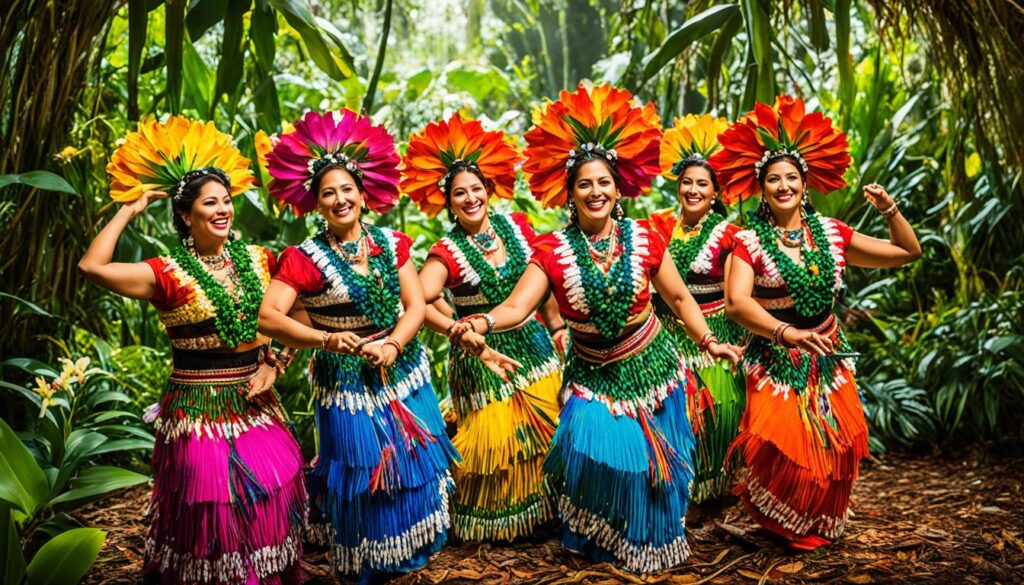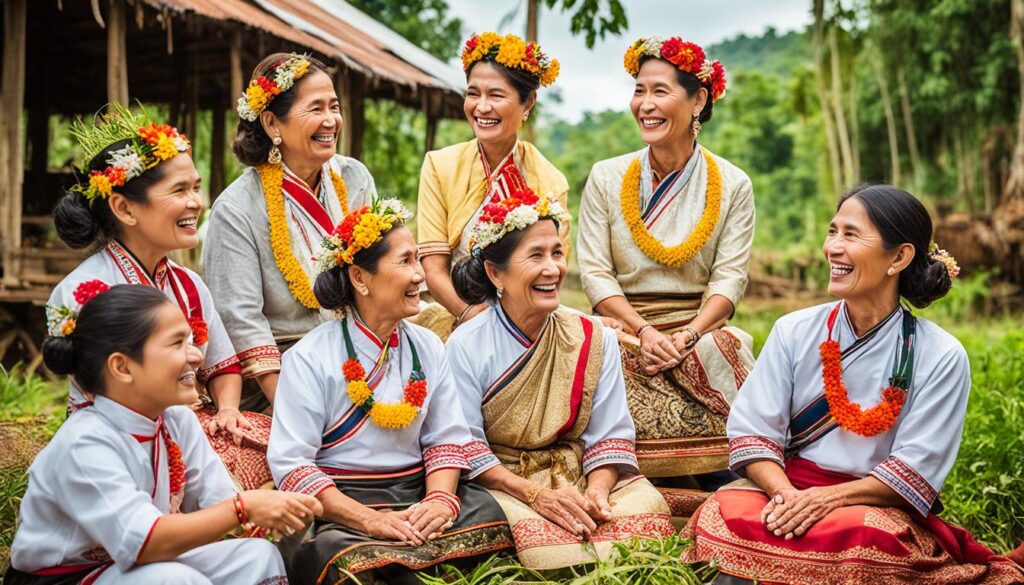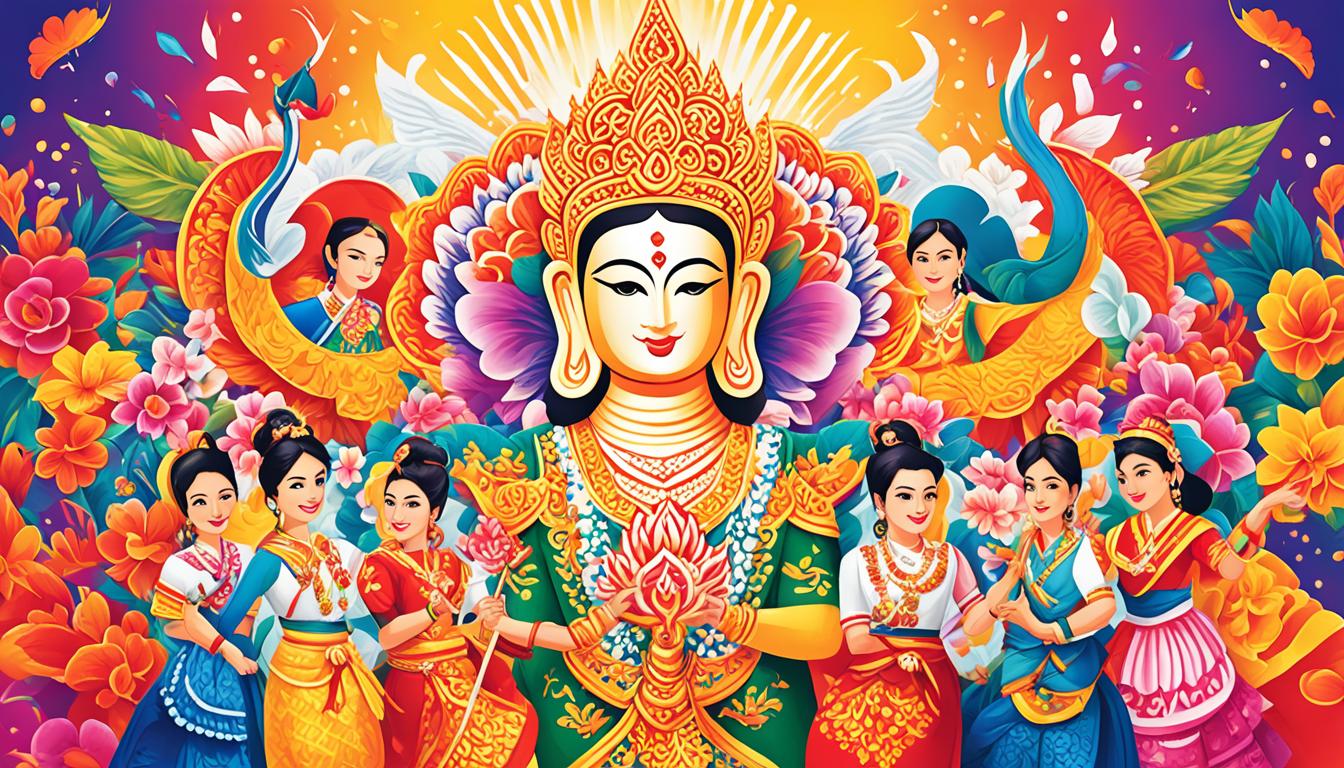Did you know that the Nyaw Language, spoken by the Nyaw people in Thailand, Laos, and Cambodia, has around 60,000 native speakers? This fascinating language is found within the Nyaw community, a group with a rich cultural heritage and unique linguistic traditions. As part of the Tai language family, the Nyaw language holds immense cultural significance and is now being extensively studied and preserved. Discover the Nyaw language, its dialects, the vibrant Nyaw language community, and the efforts being made to ensure its preservation and revitalization.
The Origin and Migration of the Nyaw People
The Nyaw people are believed to have originated from China and are part of the larger Tai ethnic group. Over time, they migrated southward, gradually conquering different lands and peoples along their way. By the tenth century, the Nyaw people had settled in Thailand, where they have established their home.
The exact details of the Nyaw people’s migration and the development of their language, Nyaw language, remain unclear. It is thought that the Nyaw language originated in the northernmost part of Laos and Tonkin.
Chinese influence has had a significant role in shaping the culture and language of the Nyaw people.
“The Nyaw people have a rich history of migration and cultural influences. Their journey from China to Thailand showcases their resilience and adaptability to new environments.” – Dr. Li Wei, Language and Culture Historian
Nyaw Language and Daily Life
The Nyaw people actively incorporate the Nyaw language into their daily lives, reflecting their strong cultural identity and heritage. While many individuals in the Nyaw community are also fluent in the national languages of Thailand and Laos, the Nyaw language remains an integral part of their social interactions, ceremonies, and traditional events.
Language serves as a means of communication within the Nyaw community, reinforcing their sense of belonging and mutual understanding. It creates a linguistic bond that connects individuals and strengthens their relationships. Through the Nyaw language, the community can express their emotions, exchange ideas, and transmit their cultural knowledge to future generations.
“Language is the thread that weaves our community together, enabling us to connect with our ancestors and preserve our cultural customs,” says Achara Thongthep, a respected elder in the Nyaw community.
In addition to their language use, the Nyaw people uphold traditional farming practices that have been passed down through generations. They rely on manual tools and traditional methods of cultivation, such as slash and burn agriculture, to grow essential crops like rice and maize. These farming practices are deeply rooted in their cultural customs and are intricately linked to their way of life.
The Nyaw community places great value on their rich customs and traditions, which are revered and perpetuated as part of their daily lives. These customs encompass a wide range of practices, including dance, music, cuisine, and clothing. Celebrations, festivals, and religious observances provide opportunities for the Nyaw people to come together, showcase their cultural heritage, and reinforce their collective identity.
Cultural Customs of the Nyaw People
Nyaw culture embraces numerous unique customs that serve as cornerstones of their community identity. Some notable cultural customs include:
- Traditional dances and music performances depicting historical events and mythology
- Elaborate ceremonies marking significant life stages, such as birth, marriage, and funeral rites
- Gastronomic traditions featuring dishes prepared using locally-sourced ingredients and traditional cooking techniques
- Clothing adorned with vibrant colors, intricate embroidery, and symbolic motifs, representing the Nyaw people’s cultural heritage
These customs are cherished and transmitted across generations, serving as a testament to the Nyaw people’s deep-rooted cultural pride and commitment to preserving their heritage.

Comparison of Nyaw Language Use and Traditional Farming Practices
| Aspect | Nyaw Language Use | Traditional Farming Practices |
|---|---|---|
| Primary Language | The Nyaw language is the primary language used for communication within the Nyaw community. | Traditional farming practices, deeply tied to cultural customs, are the primary methods used for agricultural production. |
| Bilingualism | Many Nyaw individuals are also fluent in the national languages of Thailand and Laos. | No specific bilingualism in farming practices, but farmers may have knowledge of modern agricultural techniques. |
| Social Interactions | The Nyaw language is used during social interactions, reinforcing community bonds and cultural identity. | Traditional farming practices often involve community collaboration, promoting social cohesion. |
| Cultural Significance | The Nyaw language plays a pivotal role in preserving cultural customs and transmitting cultural knowledge. | Traditional farming practices are deeply intertwined with Nyaw cultural customs and reflect their way of life. |
Nyaw Language Preservation Efforts
Preserving the Nyaw language is of utmost importance to ensure its continuation and safeguard the cultural heritage of the Nyaw community. Recognizing this significance, various initiatives have been undertaken to document and revitalize the language.
Collaboration between language experts, linguists, and community members has played a crucial role in these preservation efforts. Together, they have developed a range of learning resources, including textbooks and language courses, designed to facilitate the learning and preservation of the Nyaw language. These resources provide essential tools for both speakers and learners, contributing to the long-term vitality of the language.
In addition to learning resources, a comprehensive Nyaw language dictionary has been meticulously compiled. This dictionary serves as a valuable reference for understanding the intricacies of the language, ensuring its accurate preservation and documentation.
These collective endeavors aim to ensure that future generations have access to the Nyaw language, thereby preserving its cultural heritage. By utilizing these resources and promoting language revitalization, the Nyaw community can continue to celebrate and cherish their unique linguistic traditions.
“Preserving the Nyaw language is preserving our cultural identity and heritage. It connects us to our ancestors and allows us to pass on our customs and values to future generations.” – Nyaw community member
Significance of the Nyaw Language in the Nyaw Community
The Nyaw language holds great cultural significance within the Nyaw community. It is not only a means of communication but also a key element of their unique identity and heritage. The language is deeply intertwined with the cultural practices and traditions that have been passed down through generations.
One of the significant ways the Nyaw language is valued is through its use in traditional rituals, ceremonies, and cultural events. These occasions serve as a representation of their shared history, ancestry, and customs. The Nyaw people believe that by utilizing their native language during these important moments, they maintain a strong connection to their roots and honor their cultural heritage.
The Nyaw language also plays a vital role in reinforcing the sense of community and belonging among the Nyaw people. By using their native language, community members are able to establish deeper connections with one another and foster a shared understanding of their cultural values and traditions.
“The Nyaw language is the heart of our community, it binds us together and keeps our traditions alive,” said Naree, a member of the Nyaw community. “Speaking our language is not only about communication but an expression of our identity and pride.”
The Importance of Traditional Practices
Furthermore, the Nyaw language is inseparable from their traditional practices, such as farming techniques, craftsmanship, and weaving. These practices have been passed down through generations, and the Nyaw language serves as a medium for transmitting the essential knowledge and wisdom associated with these traditions.
“Our language holds the wisdom of our ancestors and carries the knowledge of sustainable farming practices,” shared Somchai, a farmer from the Nyaw community. “Through the use of our language, we pass down the age-old techniques and traditions that ensure the continuation of our cultural practices.”
The Nyaw language has stood the test of time and remains a powerful reminder of the richness of their cultural heritage. Its preservation and continued use are essential for the Nyaw community to maintain their unique identity and foster a strong connection with their roots.

| Traditional Practices | Importance |
|---|---|
| Farming techniques | Preserving sustainable agricultural practices. |
| Craftsmanship | Maintaining traditional art forms and skills. |
| Weaving | Preserving the art of traditional textile production. |
Challenges and Opportunities for the Nyaw Language
As with many minority languages, the Nyaw language faces various challenges in the modern world. One of the main challenges is language shift, where the dominant national languages take precedence over smaller regional languages. The influence of globalization and modernization has led to increased usage of languages such as Thai and Lao, which poses a threat to the continued use and vitality of the Nyaw language.
The rapid socioeconomic changes in Thailand, Laos, and Cambodia also contribute to the challenges faced by the Nyaw language. With the shift towards urbanization and the adoption of modern lifestyles, traditional languages like Nyaw struggle to keep pace with the demands of contemporary society.
However, amidst these challenges, there are also opportunities for language revitalization. The Nyaw community is taking the initiative to preserve and promote their language through various endeavors. Collaborations with language experts, linguists, and scholars can provide valuable insights and guidance on language preservation strategies.
It is crucial to raise awareness about the importance of the Nyaw language not only within the Nyaw community but also among the wider public. Developing learning resources, such as textbooks and language courses, can aid in language revitalization efforts. By emphasizing the cultural significance and value of the Nyaw language, its preservation and revitalization can be further supported.
| Challenges | Opportunities |
|---|---|
| Language shift towards dominant national languages | Collaboration with language experts and linguists |
| Socioeconomic changes and modernization | Awareness-raising initiatives |
| Development of learning resources |
Conclusion
The Nyaw language is not just a means of communication but also a linguistic treasure that holds immense cultural significance within the Nyaw community. Efforts aimed at preserving, documenting, and revitalizing the Nyaw language are essential to ensure its continued use and transmission to future generations. By valuing and celebrating the Nyaw language, we can contribute to the preservation of their rich cultural heritage and promote linguistic diversity.
Nyaw language preservation initiatives, such as the development of learning resources, textbooks, language courses, and a comprehensive Nyaw language dictionary, play a crucial role in keeping the language alive. By documenting its grammar, vocabulary, and cultural usage, we can ensure that the unique elements of the Nyaw language are preserved and passed down to future generations.
The Nyaw language’s cultural significance extends beyond communication. It is intertwined with the Nyaw community’s identity, traditional rituals, ceremonies, and cultural practices. The language serves as a connection to their history, ancestors, and cultural traditions, allowing them to maintain their customs, values, and a shared sense of belonging.
While the Nyaw language faces challenges due to language shift, modernization, and socioeconomic changes, there are opportunities for revitalization. Community-driven initiatives, collaborations with language experts, and raising awareness about the cultural significance and value of the Nyaw language can contribute to its preservation and revitalization. By supporting the efforts to revitalize the Nyaw language, we can help safeguard their cultural heritage and contribute to the vibrant linguistic diversity of our world.
